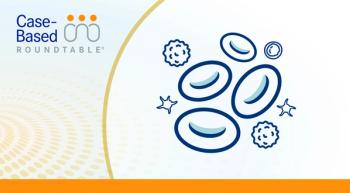
Relapsed CML: Mutation Testing and Therapy Choices
Javier A. Pinilla-Ibarz, MD, PhD:The patient response to imatinib is always assessed at 3 months. In this case, the patient had a 10% PCR, under the limit of what the patient should have. However, his doctor decided to waitand many, many times we do—to the 6-month mark to really see if his 10% PCR continued to decrease, which will be the best outcome for most of the patients. At 6 months, this patient experienced a 6% PCR level.
However, at 9 months, we start to really see that his PCR goes back to 9%. And finally, at 1 year of therapy, it’s very clear that this patient has failed therapy, based on a bone marrow evaluation and the persistence of 10 out of 20 pH-positive metaphases in the bone marrow. This is really considered a lack of complete cytogenetic response that is the optimal outcome at 1 year of therapy. So, in this case, we should consider this patient as a failure to imatinib therapy. And of course we, at this point, need to really understand why this patient failed.
So his doctor prescribed and performed these kinase mutation tests to assess if there is any able mutation responsible for the lack of activity of imatinib. In this case, as it has happened on many occasionsat least in 50% of the time—there was no mutation found that can really justify this lack of response to imatinib.
Any time that a patient relapses or lacks to achieve the wild milestone as per the NCCN guidelines, a kinase domain mutation should be performed. Kinase domain mutations evaluate the presence of specific mutations in theABLpart of the BCR-ABL protein. That will enable tyrosine kinases to really bind and effectively treat the patient. In this case, there are several mutations that have been described over the last years. Many of them can really be a lack of importance. However, a specific mutation at some point may respond to one drug versus another drug. It’s well characterized. However,tyrosine 315Iis a mutation for which none of the tyrosine kinase inhibitors, except ponatinib, are effective in the treatment of this condition. Other mutations, likeE255K,R259C, orF359I, can also be managed with other drugs. Unfortunately, the presence of a mutation may predict the onset of new mutations later on, which is something that needs to be taken into consideration.
Once a patient fails imatinib at frontline, they have multiple options for the treatment as a second line. We are lucky enough to really have at least 4 drugs available for the treatment of this patient, and even if we cannot, in some cases, have a chemotherapy drug that is very, very rarely used in the setting. The drugs will be nilotinib, dasatinib, bosutinib, and ponatinib. And the choice of any of these drugs will be for the potential comorbid conditions. The efficacy of these drugs is best in patients with resistant CML, or at least to refractory to imatinib.
Transcript edited for clarity.
A Patient With Relapsed CML and Comorbidities
December 2015
- A 64-year-old male presented to his PCP with symptoms of fever, LUQ pain, and severe fatigue.
- PMHx:
- 2012: fainting associated with Long QT syndrome managed on propranolol.
- 2014: stage 3 kidney disease (GFR; 45 mL/min)
- 2014: NSCLC, stage IIA squamous histology treated with resection and chemoradiotherapy, pleural effusion managed with thoracentesis
- PE: spleen palpable 1.5 inches below costal margin
- CBC:
- WBCs, 172,000/μL (metamyelocytes, 3%; myelocytes, 6%; basophils, 6%; blasts, 2%;
- HCT, 30%
- Platelets, 536,000/μL
- Hb, 9.9 g/dL
- Bone marrow biopsy: Ph+ in 20/20 metaphases
- Q-PCR; BCR-ABL1/ABL1 ratio, 90%
- The patient was started on therapy with imatinib 400 mg
- March 2015:BCR-ABL1, 10% Q-PCR
- June 2015:BCR-ABL1, 6% Q-PCR
- September 2015:BCR-ABL1, 9% Q-PCR
December 2016:
- BCR-ABL1, 15% Q-PCR
- Bone marrow biopsy: Ph+ in 10/20 metaphases
- Genetic testing was negative for known TKI resistance mutations
- CBC normal count









































